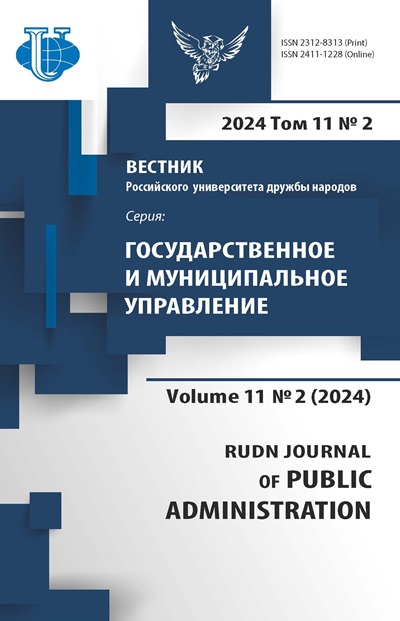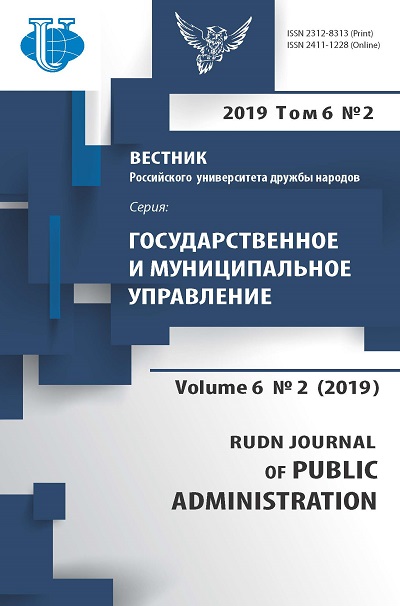Этно-религиозные ненавистнические речи и политическое насилие в четвертой республике Нигерии
- Авторы: Околе У.Ч.1,2, Окоедион Э.Г.3
-
Учреждения:
- Чартерный институт управления персоналом в Нигерии
- Государственный учебный центр Эдо
- Университет Нигерии
- Выпуск: Том 6, № 2 (2019)
- Страницы: 106-120
- Раздел: ЗАРУБЕЖНЫЙ ОПЫТ ГОСУДАРСТВЕННОГО УПРАВЛЕНИЯ
- URL: https://journals.rudn.ru/public-administration/article/view/23018
- DOI: https://doi.org/10.22363/2312-8313-2019-6-2-106-120
Цитировать
Полный текст
Аннотация
Этно-религиозные ненавистнические высказывания являются предшественником политического насилия в четвертой республике Нигерии. Хотя верно и то, что одним из величайших преимуществ демократических обществ является свобода слова, тем не менее никому не следует позволять по своему усмотрению осуществлять право на свободу слова, уничижая и унижая другого человека. В Нигерии разжигание ненависти перешло в статус стратегии политической кампании и объясняет эскалацию политического насилия в стране. В данном исследовании изучается влияние этно-религиозных ненавистнических речей на публичное насилие в четвертой республике Нигерии. В работе применяется описательные и социологические методы. Данные были собраны путем опроса 600 избирателей в районе Юг-Юг Нигерии. Исследование показало, что в четвертой республике Нигерии существовала реальная и значимая связь между этно-религиозной ненавистью и политическим насилием. В этом документе среди прочего рекомендуется, чтобы политическая кампания в Нигерии была сосредоточена на реализации важнейших национальных проблем, таких как экономические, политические, социальные, культурные, образовательные и медицинские услуги, а не на атаках политических противников или использовании чувств этнических, религиозных и региональных общин.
Ключевые слова
Об авторах
Уго Чукс Околе
Чартерный институт управления персоналом в Нигерии; Государственный учебный центр Эдо
Email: ugookolie3@gmail.com
Эсеохе Глори Окоедион
Университет Нигерии
Email: glory.okodion@unn.edu.ng
кафедра иностранных языков и литературоведения
Список литературы
- Adibe J. Fayose’s advert: offensive or hate speech? A Paper Presented at a Round Table on Hate Speech Organize by the Kukah Centre, Abuja. 2015.
- Alakali T.T., Faga H.P., Mbursa J. Audience perception of hate speech in Nigeria: implications for morality and Law // International Scientific Journal. 2017. No. 1. Pp. 161-178.
- Apam J. The role of governance in the management of ethno-religious conflicts in Nigeria // Nigerian Journal of Political and Administrative Studies. 2011. No. 2(2). Pp. 1-16.
- Aver T.T., Nnorom K.C., Targba A. Political violence and its effects on social development in Nigeria // International Journal of Humanities and Social Science. 2013. No. 3(17). Pp. 261-266.
- Bagdikian B.H. The media monopoly. Boston: Beacon press, 1997.
- Bell J. Restraining the heart less, racist speech and minority rights // Indiana Law Journal. 2009. Vol. 84(3). Pp. 979-983.
- Bello A.H. Causes and dynamic of political violence in Nigeria: Islamic views on the solutions // International Journal of Humanities and Social Science Invention. 2013. No. 2(3). Pp. 28-34.
- Chaiken S., Eagly A.H. Communication modality as a determinant of message persuasiveness and message comprehensibility // Journal of Personality and Social Psychology. 1978. Vol. 34. No. 4. Pp. 605-614.
- Erunke C.E. Ethnic question and consolidation of Nigeria democratic project: A prognosis. Being a paper presented at a International conference on Democracy and Development in Africa, Organized by the Department of political Science, Nasarawa State University, Keffi. 2011.
- Ezeibe C.C. Hate speech and electoral violence in Nigeria. A Paper Submitted to the Department of Political Science, University of Nigeria, Nsukka. 2015.
- Fasakin A., Oyero O., Ouesomi K., Okone N. Hate speech and the 2015 general elections in Nigeria // International E-Journal of Advances in Social Sciences. 2017. No. 3(9). Pp. 948-953.
- Gurr T. Why men rebel. Princeton: Princeton University press, 1970.
- Howell R. Political Snuggery in vogue. Chicago: L and T press Ltd, 2004.
- Imobighe T.A. Ethnicity and ethnic conflicts in Nigeria: An overview. Ibadan: Spectrum Books Ltd, 2003.
- Joelm J. Ethno-populism and ethno-religious hate speech in Nigeria. 2013. URL: https://www.researchate.net/publication/236268158 (accessed: 17.03.2019).
- Judge M., Nel J.A. Psychology and hate speech: A critical and restorative encounter // South African Journal of Psychology. 2013. Vol. 48. No. 1. Pp. 15-20.
- Keane D. Addressing the aggravated meeting points of race and religion // Maryland Law Journal of Race, Religion, Gender & Class. 2006. Vol. 6. Pp. 371-388.
- Leader T., Mullen B., Rice D. Complexity and violence in ethno-populisms and exclusion of ethnic out-groups: what puts the hate into hate speech // Journal of Personality and Social Psychology. 1996. Vol. 96. No. 1. Pp. 170-182.
- Leets L. Experiencing hate speech: perceptions and responses to anti-Semitism and antigay speech // Journal of Social Issues. 2002. Vol. 58. No. 2. Pp. 341-361.
- Maginnis R. Muslim hate in Nigeria: Nigeria Follows violent path of war-stricken Somalia. 2012. URL: http://www.truthandgrace.com/musliminigeria.htm (accessed: 17.03.2019).
- Massaro T. Equality and freedom of expression: the hate speech dilemma // William & Mary Law Review. 1991. No. 2(11). Pp. 1-32.
- Mrabure K.O. Counteracting hate speech and the right to freedom of expression in selected jurisdictions // Nnamdi Azikiwe University Journal of International Law and Jurisprudence. 2016. Vol. 7. Pp. 160-169.
- Neshkovska S., Trajkova Z. The essentials of hate speech // International Journal of Education. 2017. Vol. 14. No. 1. Pp. 71-80.
- Nnoli O. Ethnic Politics in Nigeria. Eungu: Fourth Dimension publishers, 1978.
- Orji N., Uzodi N. Postelection violence in Nigeria: Experiences with the 2011 election. Abuja: policy and Legal Advocacy Centre. 2012.
- Oyode E. The military and the national question. Kaduna: Arewa House, 1994.
- Rasaq A., Udende P., Ibrahim A., Oba L. Media, politics, and hate speech: A critical discourse analysis // E-Academia Journal. 2017. No. 6(1). Pp. 240-252.
- Tamuno T.N. The evolution of the Nigerian states. London: Longman publishers, 1972.
- Tayfel H., Turner J.C. Social identity and intergroup relations. Cambridge: Cambridge University press, 1985.
- Turner J.C. Towards a cognitive redefinition of the social group. Cambridge University Press, 1982.
- Ugbechie K. Hate speech is not free speech in Nigeria today. 2017. URL: http://www.nigeroatpday.ng/2017/02/hate speech is not free speech (accessed: 17.03.2019).
- Ugunmwuangho S.O., Epelle A. Challenges and solutions to ethno-religious conflicts in Nigeria: case study of the Jos crises // Journal of Sustainable Development in Africa. 2011. Vol. 13. No. 5. Pp. 109-124.
- Wikff S. Ethnic conflicts: A global perspective. Oxford: Oxford University press, 2006.
















